动词不定式作宾语和宾语补足语
非谓语动词作定语和宾语补足语总结

非谓语动词作定语和宾语补足语总结非谓语动词是指不带有谓语成分的动词形式,包括动词不定式、动名词和现在分词、过去分词。
在句子中,非谓语动词可以用作定语和宾语补足语,用于修饰名词或补充说明动作的情况。
本文将对非谓语动词作定语和宾语补足语的用法进行总结。
一、非谓语动词作定语非谓语动词作定语时,通常与被修饰词之间存在逻辑上的主动或被动关系。
常见的用法有以下几种:1. 动词不定式作定语动词不定式作定语时,说明所修饰名词的用途、目的、结果等。
常见结构为“名词 + 不定式”,不定式可以是带to的原形,也可以是不带to的原形。
例如:- 他有个完全实现梦想的机会。
- 这个女孩太害羞了,从不和人交流。
2. 动名词作定语动名词作定语时,表示该名词的用途、目的、结果等。
常见结构为“动名词 + 名词”。
例如:- 听力训练是学习英语的重要环节。
- 这本书是关于如何提高写作技巧的。
3. 现在分词作定语现在分词作定语时,表示所修饰名词正在进行的动作或状态。
常见结构为“现在分词 + 名词”。
例如:- 拉着行李箱的女人是我的妈妈。
- 那个躺在床上的男孩是我的弟弟。
4. 过去分词作定语过去分词作定语时,表示所修饰名词已经完成的动作或状态。
常见结构为“过去分词 + 名词”。
例如:- 这本被翻阅过许多次的书籍是我的宝贝。
- 我看过的那部电影非常精彩。
二、非谓语动词作宾语补足语非谓语动词作宾语补足语时,用于补充说明宾语的动作或状态。
常见的用法有以下几种:1. 动词不定式作宾语补足语动词不定式作宾语补足语时,说明宾语完成的动作。
常见的结构为“动词 + 宾语 + 不定式”。
例如:- 我喜欢听音乐。
- 她希望学好英语。
2. 动名词作宾语补足语动名词作宾语补足语时,表示宾语的动作或状态。
常见结构为“动词 + 宾语 + 动名词”。
例如:- 我通常喜欢读书。
- 他不值得你浪费时间。
3. 现在分词作宾语补足语现在分词作宾语补足语时,表示宾语正在进行的动作。
Unit6动词不定式作宾语补足语和目的状语-2023-2024学年八年级英语上册(牛津译林版)
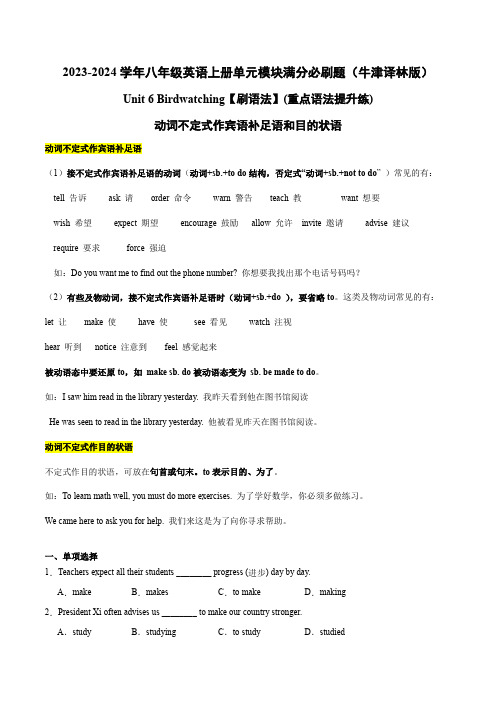
2023-2024学年八年级英语上册单元模块满分必刷题(牛津译林版)Unit 6 Birdwatching【刷语法】(重点语法提升练)动词不定式作宾语补足语和目的状语动词不定式作宾语补足语(1)接不定式作宾语补足语的动词(动词+sb.+to do结构,否定式“动词+sb.+not to do” )常见的有:tell 告诉ask 请order 命令warn 警告teach 教want 想要wish 希望expect 期望encourage 鼓励allow 允许invite 邀请advise 建议require 要求force 强迫如:Do you want me to find out the phone number? 你想要我找出那个电话号码吗?(2)有些及物动词,接不定式作宾语补足语时(动词+sb.+do ),要省略to。
这类及物动词常见的有:let 让make 使have 使see 看见watch 注视hear 听到notice 注意到feel 感觉起来被动语态中要还原to,如make sb. do被动语态变为sb. be made to do。
如:I saw him read in the library yesterday. 我昨天看到他在图书馆阅读He was seen to read in the library yesterday. 他被看见昨天在图书馆阅读。
动词不定式作目的状语不定式作目的状语,可放在句首或句末。
to表示目的、为了。
如:To learn math well, you must do more exercises. 为了学好数学,你必须多做练习。
We came here to ask you for help. 我们来这是为了向你寻求帮助。
一、单项选择1.Teachers expect all their students ________ progress (进步) day by day.A.make B.makes C.to make D.making2.President Xi often advises us ________ to make our country stronger.A.study B.studying C.to study D.studied3.—Our English teacher asks us ________ English every day.—So my mother made me ________ the English text for half an hour yesterday evening.A.read; to read B.to read; to read C.to read; read4.There are many rules in Mary’s home. Her parents won’t allow her ________ out late.A.to stay B.staying C.stay D.stayed5.I see Tom ________ English almost every morning.A.reads B.read C.reading D.to read 6.Teachers always encourage their students ________ questions and discuss the answers.A.answer B.answers C.answering D.to answer 7.The workers in the nature park ask visitors not ________ the animals.A.feed B.to feed C.feeding D.fed8.My mother asks me ________ computer games before finishing my homework.A.not play B.to play C.not to play D.to not play 9.Evans had a sore throat (嗓子疼). His friend advised him ________ a doctor.A.seeing B.to see C.see D.sees10.—The doctor advised me ________ too much because it’s not good for my health.—The doctor is right. The less you drink, ________ you will be.A.don’t drink; the healthier B.not to drink; the healthierC.not to drink; the more healthier D.don’t drink; healthier11.Mrs. Smith made her daughter ________ for a long time.A.wait B.waited C.to wait D.waiting12.The old lady loves to watch the kids ________ basketball every evening.A.play B.played C.to play D.plays13.Our teacher tells us ________ in the street. It’s too dangerous.A.not play B.not playing C.not to play D.to not play 14.— Why is Nancy crying?— Because her mother forces her ________ her teeth twice a day.A.brush B.brushing C.to brush D.brushed15.We don’t allow ________ in the classroom, but we allow students ________ in the hallways.A.to sing; to sing B.singing; to sing C.to sing; singing16.I advise you ________ twice before ________ final decision.A.thinking, to make B.to think, make C.thinking, made D.to think, making 17.Lin Tao is hard-working. I often see him ________ English. Yesterday afternoon, when I passed the playground, I saw him ________ soccer.A.read; playing B.reads; played C.to read; play D.be reading; play18.Our teacher often encourages us _______ our dreams no matter what will happen.A.to give up B.not to give up C.not give up D.not giving up19.The teacher advised students ________ to music when doing homework because it would distract (分散) their attention.A.listen B.to listen C.not to listen D.to not listen20.Tom challenged his friend ________ chess.A.play B.playing C.to play D.to playing21.—Can the shelf be finished by the weekend?—Sure. ________ it on time, we will work two more hours a day.A.Completed B.Completing C.To complete D.Complete22.—________ more about tomorrow’s weather in Sheyang, please call 121.—OK, I will. Thank you.A.Know B.Knowing C.To know D.To knowing23.—What way can you think of ________ me improve my listening?—By listening to the tape more.A.helping B.to help C.help24.________ their health, students should exercise more.A.Improve B.To improve C.Improving D.Improved25.Hunters hunt tigers ________ their fur ________ make clothes.A.to; to B.for; to C.to; for D.for; for26.________ the work in time, they need to work two more hours a day.A.To finish B.To be finished C.Finish D.Finishing27.We should do what we can ________ the hunters ________ the animals.A.to prevent; killing B.to prevent; to kill C.prevent; killing D.prevent; to kill 28.healthy, you should eat more vegetables and less fast food.A.Keep B.To keep C.Keeping D.Kept29.—If you need my help, please let me know. I will do anything I can ________ you.—No, thanks. I can do it all by myself.A.to support B.support C.supporting D.supported30.—Wild animals are in danger. They need more people’s help.— Yes. People working in the reserves are doing everything they can ________ them.A.protect B.protecting C.to protect D.to protecting31.________ before training, we all arrive early every time.A.Warm up B.Warming up C.To warm up D.Warmed up32.________ their products more easily, many farmers put them online.A.Sell B.Selling C.To sell D.To selling33.—Peter’s mother gets up early ______ breakfast for him every morning.—Mother’s love is great.A.to make B.making C.make34.President Xi Jinping delivers a New Year address on Saturday evening, Dec 31, 2022, in Beijing ______ 2023.A.welcome B.welcoming C.welcomed D.to welcome35.Susan made some more dumplings ________ her friend a treat during the Spring Festival.A.gives B.giving C.to give D.give36.Shall we go to Lao She Teahouse ________ Beijing Opera?A.to enjoy B.enjoy C.enjoyed D.enjoys37.I’m not good at English. I will work hard ______ it.A.to improve B.improve C.to correct D.correct38.You should practise ______ more in order to ______ your written English.A.to write;improving B.writing;improvingC.writing;improve D.to write;improve39.Last weekend Peter went to the library ________ some books on music.A.borrow B.borrowed C.to borrow D.borrowing40.He ran into the room ________ the girl.A.save B.to save C.saves D.saved二、用所给单词的正确形式填空41.He tried everything (start) the car, but he didn’t make it.42.The doctor did what he could (help) the girl who was badly hurt in the accident. 43.He started a blog (share)his knowledge and connect with like-minded individuals. 44.The teachers send emails (tell) students something on holidays.45.(keep) healthy, you should take more exercise.46.(make) the salad look more colourful, I often mix different fruits together.47.Look! The teenagers are making cards (show) love for their mothers.48.I made a lot of money (help) the poor.49.They decide to do something (protect) the animals.50.All doctors did what they could (save) the people after the earthquake.51.My little son fell in love with chess and often challenged me (play) chess with him. 52.Let’s (glue)these pictures on the big paper.53.Sally invited me (come) to the party, but I forgot it.54.The World Wide Fund for Nature (WWF) chose the panda (be) its symbol. 55.Could you tell my father (call) me when he comes back?56.We often hear some students (practice) speaking English in the English corner. 57.He warns Tom (not make) the same mistake again.58.I would like you (meet) a friend of mine.59.I would like to help people (solve) problems.60.He ordered his men (run) fast.参考答案:1.C【详解】句意:老师们希望所有的学生都能一天比一天进步。
非谓语动词在句子中作状语和作宾语补足语的不同用法
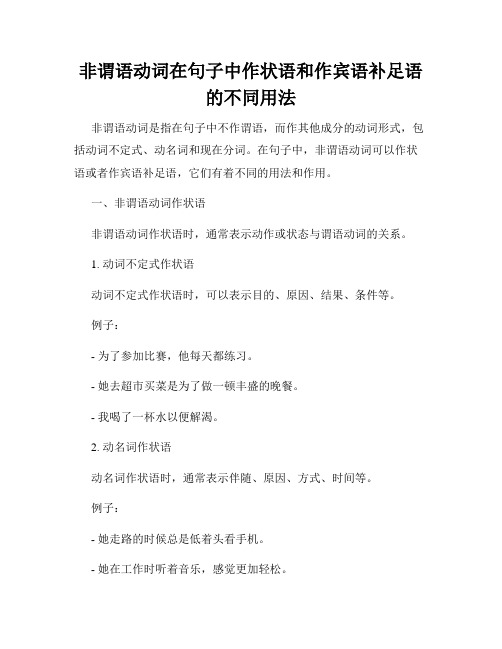
非谓语动词在句子中作状语和作宾语补足语的不同用法非谓语动词是指在句子中不作谓语,而作其他成分的动词形式,包括动词不定式、动名词和现在分词。
在句子中,非谓语动词可以作状语或者作宾语补足语,它们有着不同的用法和作用。
一、非谓语动词作状语非谓语动词作状语时,通常表示动作或状态与谓语动词的关系。
1. 动词不定式作状语动词不定式作状语时,可以表示目的、原因、结果、条件等。
例子:- 为了参加比赛,他每天都练习。
- 她去超市买菜是为了做一顿丰盛的晚餐。
- 我喝了一杯水以便解渴。
2. 动名词作状语动名词作状语时,通常表示伴随、原因、方式、时间等。
例子:- 她走路的时候总是低着头看手机。
- 她在工作时听着音乐,感觉更加轻松。
- 他生气时喜欢一个人静静地待在房间里。
3. 现在分词作状语现在分词作状语时,通常表示时间、原因、结果、条件等。
例子:- 孩子们坐在河边嬉戏的时候,天空中飞过一只小鸟。
- 雨停了,她放下伞继续前行。
- 他跑得太快,以至于摔倒在地。
二、非谓语动词作宾语补足语非谓语动词作宾语补足语时,通常与及物动词或介词搭配使用,用来修饰宾语。
1. 动词不定式作宾语补足语动词不定式作宾语补足语时,通常表示动作的结果或目的。
例子:- 她希望能赚到更多的钱。
- 他们需要找到一个解决问题的方法。
- 我喜欢把房间布置得温馨舒适。
2. 动名词作宾语补足语动名词作宾语补足语时,通常表示动作的结果、原因、方式等。
例子:- 他喜欢听别人讲故事。
- 她害怕看到血液。
- 我对你的成功感到骄傲。
3. 现在分词作宾语补足语现在分词作宾语补足语时,通常表示动作的结果、方式等。
例子:- 孩子们使整个教室变得非常吵闹。
- 她发现这个问题变得越来越困难。
- 他的话让她感到非常惊讶。
总结起来,非谓语动词在句子中作状语时表示动作与谓语的关系,可以使用动词不定式、动名词和现在分词。
非谓语动词作宾语补足语时则用来修饰宾语,常见的形式有动词不定式、动名词和现在分词。
不定式做宾语、补足语。

不定式做宾语、补足语。
不定式在“主语+谓语+宾语+宾语补足语”句型中充当宾语补足语。
在这一句型中,宾语是动词不定式的逻辑主语。
1.再表示感觉的动词后面作宾语补足语,并且不定式都不带to.这一类动词有:see, hear, feel, watch, notice, observe, look at, listen to,等。
I here them sing yesterday.昨天我听见他们唱歌了。
Did you see him go out?你看见他们出去了吗。
I felt something crawl up my leg.我感到有什么东西爬道我腿上了。
2.在使役动词后作宾语补足语,不定式不带to.这一类动词有:make, let, have等。
转为被动语态时,其后通常都用带to的不定式(have没有被动语态)What would you have me do?你要我做什么?She made him give up smoking.她让他戒烟了。
Let him do whatever he whishes to do.他想干什么就让他干吧。
3.在表示心理状态的动词后作宾语补足语。
这类动词有:consider, think, believe, discover, find, imagine, judge,suppose, prove 等。
这类动词后的不定式通常是“to be+形容词或名词”结构,think,consider,find后的to be常可省略。
We consider him (to be) a good teacher.我们认为他是一个好老师。
He proved that theory (to be) very important.他证明那个理论是很重要的。
I thought her (to be) nice and honest the first time I met her.我第一次见到她的时候就认为她人很好,很诚实。
宾语补足语七种类型英语举例
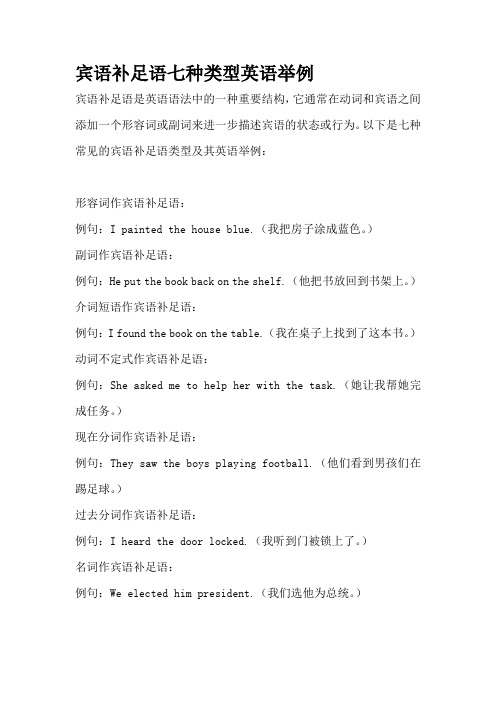
宾语补足语七种类型英语举例
宾语补足语是英语语法中的一种重要结构,它通常在动词和宾语之间添加一个形容词或副词来进一步描述宾语的状态或行为。
以下是七种常见的宾语补足语类型及其英语举例:
形容词作宾语补足语:
例句:I painted the house blue.(我把房子涂成蓝色。
)
副词作宾语补足语:
例句:He put the book back on the shelf.(他把书放回到书架上。
)介词短语作宾语补足语:
例句:I found the book on the table.(我在桌子上找到了这本书。
)动词不定式作宾语补足语:
例句:She asked me to help her with the task.(她让我帮她完成任务。
)
现在分词作宾语补足语:
例句:They saw the boys playing football.(他们看到男孩们在踢足球。
)
过去分词作宾语补足语:
例句:I heard the door locked.(我听到门被锁上了。
)
名词作宾语补足语:
例句:We elected him president.(我们选他为总统。
)
这些是七种常见的宾语补足语类型,每种都有不同的用法和特点。
理解这些结构可以帮助更好地掌握英语语法。
动词不定式作宾语和宾语补足语

carefully.
3.Birds are never heard__t_o__s_i_n_g_(sing) here. 4.Did you notice him_n_o_t_i_c_e__(leave) the classroom?
•.
动词不定式 作宾语和宾语补足语
寺头中学 焦晓娜
.
动词不定式作宾语
We are planning to build another subway in Taiyuan.
I want to go home. want to do sth
plan to do sth
那么,哪些动词都能接不定式作宾语呢?
•.
make sb (not) do sth sb be made (not) to do sth
s young, I wished _t_o___b_e_(be)a policeman. 2.The teacher asked us t_o__c__o_p(cyopy) all the new words
•.
常用省to动词不定式作宾语补足语的动词有:
一感:feel 二听:listen to, hear 三使:make, let, have 四看:see,watch,look,notice
动词不定式作宾语补足语、目的状语

一.动词不定式作宾语补足语1.because i t allows people to get closer to them. 因为它允许你们更近距离的接触它们。
Allow是动词,people 是宾语to get closer to them 作宾语people的补足语2.the world wide fund for nature chose the panda to be itssymbol. 世界自然基金会选择了大熊猫作为其标志。
Choose----chose 是动词,the panda 是宾语to be its symbol 作宾语补足语3.ask sb to do sth 让某人做某事tell sb to do sth 告诉某人做某事invite sb to do sth 邀请某人做某事help sb to do sth 帮助某人做某事want sb to do sth 想要某人做某事allow sb to do sth 允许某人做某事4.tell sb not do sth 告诉某人不要做某事my teacher tellsus not to make too much noise. 我的老师告诉我们不要弄出太大声音。
My friend invites me to his home. 我的朋友邀请我去他的家里。
5.help/let/make sb do sth 帮助某人做某事/让某人做某事his words makes everyone laugh. 他的话让每个人都笑了she helps me do my homework. 她帮助我做作业二.动词不定式作目的状语:做某事是为了什么.1.the wwf is working hard to save them all. 世界自然基金会正在努力挽救所有的动物。
To save them all 是目的状语2.dylan trained hard to improve his basketball skills. 迪伦刻苦训练一提高自己的篮球技能。
动词不定式作宾语及宾语补足语
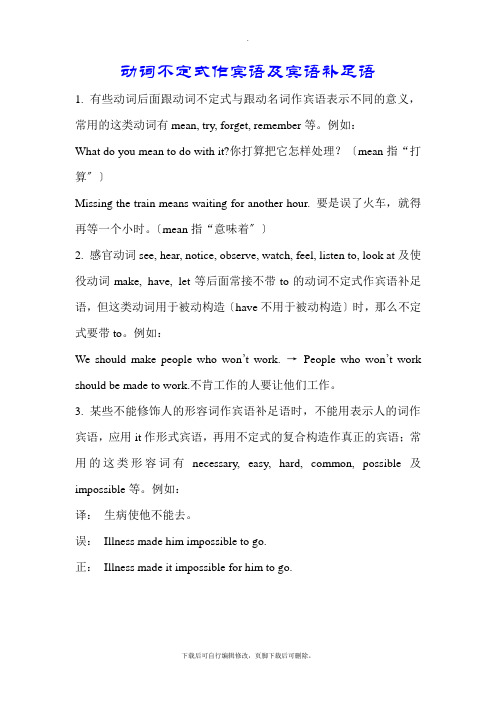
.
动词不定式作宾语及宾语补足语
1. 有些动词后面跟动词不定式与跟动名词作宾语表示不同的意义,常用的这类动词有mean, try, forget, remember等。
例如:
What do you mean to do with it?你打算把它怎样处理?〔mean指“打算〞〕
Missing the train means waiting for another hour. 要是误了火车,就得再等一个小时。
〔mean指“意味着〞〕
2. 感官动词see, hear, notice, observe, watch, feel, listen to, look at及使役动词make, have, let等后面常接不带to的动词不定式作宾语补足语,但这类动词用于被动构造〔have不用于被动构造〕时,那么不定式要带to。
例如:
We should make people who won’t work. →People who won’t work should be made to work.不肯工作的人要让他们工作。
3. 某些不能修饰人的形容词作宾语补足语时,不能用表示人的词作宾语,应用it作形式宾语,再用不定式的复合构造作真正的宾语;常用的这类形容词有necessary, easy, hard, common, possible 及impossible等。
例如:
译:生病使他不能去。
误:Illness made him impossible to go.
正:Illness made it impossible for him to go.
下载后可自行编辑修改,页脚下载后可删除。
动词不定式

3. I've known him t_o__ru__n very fast. 我听说他跑得比较快。
4. What did you understand him _to__s_a_y? 你认为他说的是什么意思呢?
V. make, have, let, see, watch, hear, feel , notice
2. 用作宾语补足语:(v. + sb. + to do )
She asked me to help her.
The teacher told him to come on time.
Edison’s mother taught him to read and write.
want sb. to do
7. 疑问词who, what, which, where, when, how 加to do可构成不定式短语, 在句中可 用作主语、宾语、宾语补足语、表语等。
When to start has not been decided. (主语) I don’t know what to do. (宾语) He can tell you where to get the book. (宾语补足语) The question is who(m) to ask. (表语)
4.用作主语(这时可将其用形式主语it来替换)
1. To be here at Christmas time is my dream. →It is my dream to be here at Christmas time.
2. To go abroad is his dream. → It is his dream to go abroad.
need to do learn to do agree to do plan to do decide to do refuse to do begin to do start to do try to do forget to do remember to do like to do Stop to do go on to do
动词不定式的用法

动词不定式形式为“to+动词原形” 1.动词不定式做主语.谓语用三单形式. 如果主语较长则用it做形式主语,将真正的主 语动词不定式放到句尾. e.g. To see is to believe. It’s a bad habit to run after dinner. 2 做表语( 常位于系动词be后面) My duty is to look after my little sister.
链接中考 B their (2015广东)1.We advise parents children at home alone in order to keep them away danger. A.leaving B.not to leave C. leave D.to leave (2014广东)2.In order A for the meeting,my sister forced herself to get up early this morning. A.not to be late B.not being late C. to be late D.being late (2013广东)---I don’t hear you came in just now. ex ---That’s good.We tried B any noise,for you were sleeping.. A.not make B.not to make C. to make D. making
链接中考 (2017广东)1.For more than once,our head Teacher asks us D the habit of keeping a diary. A.develop B.develops C. developing D.to develop (2017甘肃)2.We’ll do what we can A the sick people. A.to help B.help C. helps D.helped (2016广东)3.Leonardo Dicaprio, a famous American actor,was always expecting A an Oscar and fiinning C. not to win D.not winning
动词不定式的用法归纳

My question is when to start.
注意:•在与why连用时,只用于why或why not开头的简 短疑问句中,后面紧跟的动词不定式不带to。
Why not have a rest?
(9) 不定式的省略
3. 表示原因: 不定式可以用在作表语的形容词后作 状语, sorry, surprised, happy, glad, eager, angry, foolish, right, wrong, slow, quick, rude, cruel, disappointed等。
eg: I’m glad/pleased to see you. We were surprised to hear the news.
(4).独立结构作状语
To tell (you) the truth, I don’t agree with you.
类似的结构 •to be frank, •to be honest (with you), •to make things worse,
(8)不定式与疑问词who,which, when, how, what等连用,在句中起名词作用,可充当主语、 表语、宾语等。 He didn’t know what to say.
4. I don’t have time to sit around feeling sorry for myself. (attribute)
5. I am the only student in my class to have a pet snake. (attribute)
6. A big company has decided to buy it from me. (object)
不定式做宾语补足语及练习
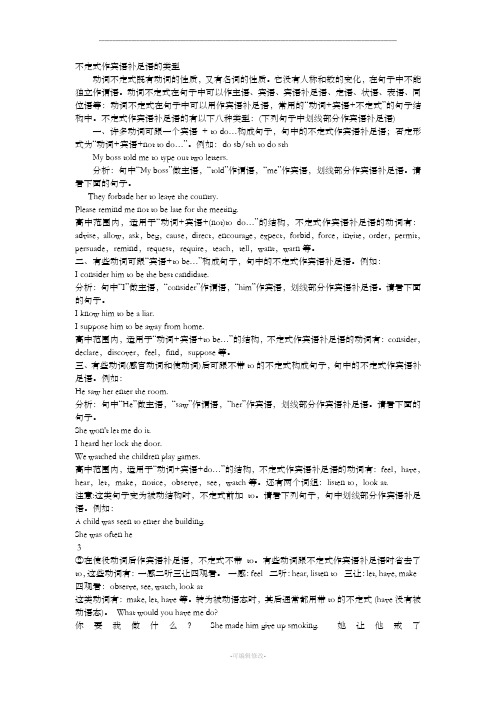
不定式作宾语补足语的类型动词不定式既有动词的性质,又有名词的性质。
它没有人称和数的变化,在句子中不能独立作谓语。
动词不定式在句子中可以作主语、宾语、宾语补足语、定语、状语、表语、同位语等:动词不定式在句子中可以用作宾语补足语,常用的“动词+宾语+不定式”的句子结构中。
不定式作宾语补足语的有以下八种类型:(下列句子中划线部分作宾语补足语)一、许多动词可跟一个宾语+ to do…构成句子,句中的不定式作宾语补足语;否定形式为“动词+宾语+not to do…”。
例如:do sb/sth to do sthMy boss told me to type out two letters.分析:句中“My boss”做主语,“told”作谓语,“me”作宾语,划线部分作宾语补足语。
请看下面的句子。
They forbade her to leave the country.Please remind me not to be late for the meeting.高中范围内,适用于“动词+宾语+(not)to do…”的结构,不定式作宾语补足语的动词有:advise,allow,ask,beg,cause,direct,encourage,expect,forbid,force,invite,order,permit,persuade,remind,request,require,teach,tell,want,warn等。
二、有些动词可跟“宾语+to be…”构成句子,句中的不定式作宾语补足语。
例如:I consider him to be the best candidate.分析:句中“I”做主语,“consider”作谓语,“him”作宾语,划线部分作宾语补足语。
请看下面的句子。
I know him to be a liar.I suppose him to be away from home.高中范围内,适用于“动词+宾语+to be…”的结构,不定式作宾语补足语的动词有:consider,declare,discover,feel,find,suppose等。
动词不定式
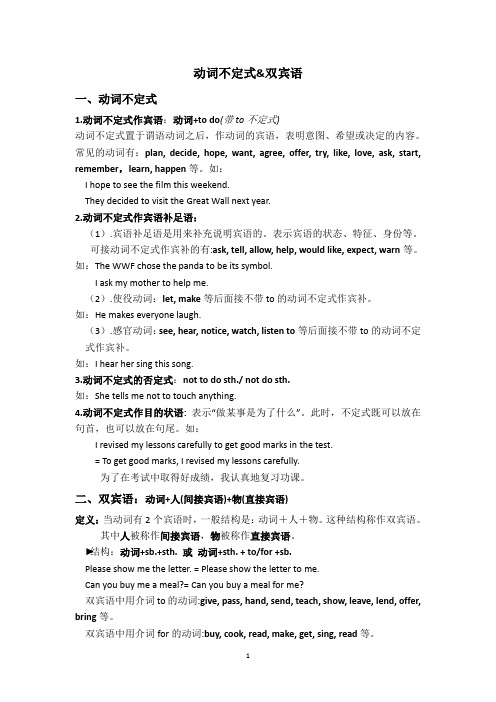
动词不定式&双宾语一、动词不定式1.动词不定式作宾语:动词+to do(带to不定式)动词不定式置于谓语动词之后,作动词的宾语,表明意图、希望或决定的内容。
常见的动词有:plan, decide, hope, want, agree, offer, try, like, love, ask, start, remember,learn, happen等。
如:I hope to see the film this weekend.They decided to visit the Great Wall next year.2.动词不定式作宾语补足语:(1).宾语补足语是用来补充说明宾语的。
表示宾语的状态、特征、身份等。
可接动词不定式作宾补的有:ask, tell, allow, help, would like, expect, warn等。
如:The WWF chose the panda to be its symbol.I ask my mother to help me.(2).使役动词:let, make等后面接不带to的动词不定式作宾补。
如:He makes everyone laugh.(3).感官动词:see, hear, notice, watch, listen to等后面接不带to的动词不定式作宾补。
如:I hear her sing this song.3.动词不定式的否定式:not to do sth./ not do sth.如:She tells me not to touch anything.4.动词不定式作目的状语:表示“做某事是为了什么”。
此时,不定式既可以放在句首,也可以放在句尾。
如:I revised my lessons carefully to get good marks in the test.= To get good marks, I revised my lessons carefully.为了在考试中取得好成绩,我认真地复习功课。
动词不定式在句中可充当主语

动词不定式在句中可充当主语、表语、宾语、宾补、定语和状语等。
1.作主语作主语用的动词不定式常常用it替代,动词不定式(或短语)放在后面。
例如:It's easy to get lost in a big city like Tokyo.在东京这样的大城市容易迷路。
It is terrible to see the ship sinking into the sea.目睹轮船沉入大海,真是太可怕了。
动词不定式作主语可位于句首。
例如:To learn a skill is very important for everyone in society.也可使用it作形式主语,而将其置于句末。
例如:It is necessary for young students to learn a foreign language.动词不定式作主语的常用句型有:1. It is+adj./ n. (+for sb./sth.) +to do sth.用于此句型的形容词有:easy, hard, difficult, possible, important, impossible, necessary, good, bad, exciting, interesting, surprising等。
例如:It is interesting to play this game.It is necessary for you to change your job.It was impossible for them to complete the task in such a short time.考例1:Is ____ possible to fly to the moon in a spaceship? (88 MET)A. nowB. manC. thatD. it用于此句型的名词有:pity, shame, pleasure, one’s duty, one’s job, fun, joy, good manners, bad manners等。
不定式做宾语状语和宾语补足语的用法-概述说明以及解释

不定式做宾语状语和宾语补足语的用法-概述说明以及解释1.引言1.1 概述概述部分的内容:不定式是英语语法中的一个重要结构,它可以作为宾语状语和宾语补足语出现。
作为宾语状语,不定式能够修饰和说明动作的目的、原因、方式等情况;而作为宾语补足语,不定式则用来补充或者完善宾语的意义。
掌握不定式作为宾语状语和宾语补足语的用法对于我们理解和运用英语具有重要意义。
本文将首先介绍不定式作为宾语状语的用法,包括表示目的、原因和方式的情况。
接着,将详细探讨不定式作为宾语补足语的用法,其中涉及到及物动词和介词后的宾语补足语。
最后,我们将比较不定式作为宾语状语和宾语补足语的区别,以及它们在实际运用中的应用领域和意义。
通过本文的阅读,读者将能够系统地了解和掌握不定式作为宾语状语和宾语补足语的用法。
同时,我们也将展望未来关于不定式的研究方向,并探讨它们在语言学领域中的实际应用价值。
总之,本文将提供一个全面而系统的介绍不定式作为宾语状语和宾语补足语的用法,并对其在实际运用中的意义进行探讨。
希望本文能够为读者提供一定的帮助和指导,同时也为今后相关研究提供一定的借鉴。
1.2 文章结构本文将会以以下几个部分来探讨不定式作为宾语状语和宾语补足语的用法。
2.正文:2.1 不定式作为宾语状语的用法:在这一部分,我们将阐述不定式作为宾语状语的基本用法和常见结构。
我们将探讨不定式作为目的状语、原因状语、结果状语和方式状语的具体用法,并给予例子进行说明。
2.2 不定式作为宾语补足语的用法:这一部分将着重讨论不定式作为宾语补足语时的用法。
我们将讲解不定式作为及物动词的宾语补足语和使役动词的宾语补足语的用法,同时给出一些常见的例子进行解析。
2.3 不定式作为宾语状语和宾语补足语的区别:在这一部分,我们将对不定式作为宾语状语和宾语补足语的区别进行详细比较和分析。
我们将探讨两者的语法特点、用法上的差异,并通过一些实例来解释它们之间的区别和联系。
3.结论:3.1 总结不定式作为宾语状语和宾语补足语的用法:在这一部分,我们将对之前的讨论进行总结,并对不定式作为宾语状语和宾语补足语的用法进行概括性的总结。
非谓语动词作定语和宾语补足语归纳
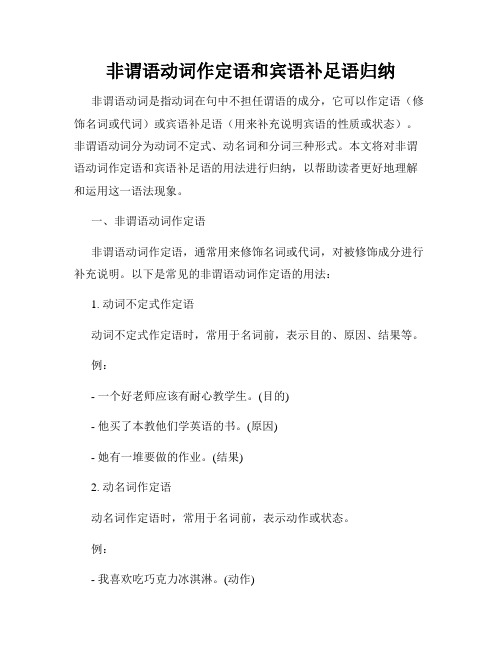
非谓语动词作定语和宾语补足语归纳非谓语动词是指动词在句中不担任谓语的成分,它可以作定语(修饰名词或代词)或宾语补足语(用来补充说明宾语的性质或状态)。
非谓语动词分为动词不定式、动名词和分词三种形式。
本文将对非谓语动词作定语和宾语补足语的用法进行归纳,以帮助读者更好地理解和运用这一语法现象。
一、非谓语动词作定语非谓语动词作定语,通常用来修饰名词或代词,对被修饰成分进行补充说明。
以下是常见的非谓语动词作定语的用法:1. 动词不定式作定语动词不定式作定语时,常用于名词前,表示目的、原因、结果等。
例:- 一个好老师应该有耐心教学生。
(目的)- 他买了本教他们学英语的书。
(原因)- 她有一堆要做的作业。
(结果)2. 动名词作定语动名词作定语时,常用于名词前,表示动作或状态。
例:- 我喜欢吃巧克力冰淇淋。
(动作)- 我们正在进行一场环保活动。
(状态)- 这是一种减压的方法。
(状态)3. 分词作定语分词作定语时,通常有现在分词和过去分词两种形式,用于形容名词的特定状态或特征。
例:- 她穿着一件红色的连衣裙。
(现在分词形容名词的状态)- 这个破旧的建筑物即将被拆除。
(过去分词形容名词的特征)- 孩子们对教室里展示的画作非常感兴趣。
(过去分词形容名词的状态)二、非谓语动词作宾语补足语非谓语动词作宾语补足语,用来补充说明宾语的性质或状态。
以下是常见的非谓语动词作宾语补足语的用法:1. 动词不定式作宾语补足语动词不定式作宾语补足语时,通常用在宾语之后,表示目的、结果等。
例:- 她让儿子吃苹果,以增强他的免疫力。
(目的)- 我听到他打开了门。
(结果)- 他把座位调整得更适合工作。
(结果)2. 动名词作宾语补足语动名词作宾语补足语时,通常用在宾语之后,表示动作或状态。
例:- 我喜欢看电影。
(动作)- 她懂得如何解决这个问题。
(动作)- 我不能忍受他对我说谎。
(状态)3. 分词作宾语补足语分词作宾语补足语时,通常有现在分词和过去分词两种形式,用于形容宾语的特定状态或特征。
怎么区别不定式作为宾补还是状语呀

====Word行业资料分享--可编辑版本--双击可删====怎么区别不定式作为宾补还是状语呀?这两种都是把动词不定时放于动词之后。
这个动词就很关键了,如果是及物动词,后边可以带宾语,如ask/like/teach/tell/help+to do sth.则动词不定式是做的宾语补足语。
第二种情况是放在不及物动词之后,如go/com/stop+to do sth.则应该翻译为状语,一般为地点状语。
ONE:宾语表示动作行为的对象,跟在及物动词之后,能作宾语的有名词,代词,数词,动词不定式等。
We like Eng'lish.我们喜欢英语。
注意看你翻译出句子后,它是做的动作的对象内容,还是只是表明地点、时间、原因、目的、结果、条件、方向、程度、方式和伴随状况等。
TWOask/like/teach/tell/help+to do sth,里面的动词后面可以跟宾语,我们称作及物动词。
例如,Father often tells me to study hard(爸爸经常告诉我要努力学习)。
第一点,这个句子中的谓语动词是tell(告诉),后边就可以直接跟宾语,如Please tell me the truth(请告诉我真相),第二点,这个句子里me做的是直接宾语,也就是告诉的对象,而to study hard做的是宾语补足语,也就是告诉的内容。
go/come/stop+to do sth则应该翻译为状语THREE第一,这些词后边不能带宾语的。
例如,Lily goes to school every morning.(lily每天早晨去上学)这里的to school 就是表明地点的地点状语,而不是宾语,也就是动作的承受者了。
第二,英语中,修饰动词、形容词、副词等的句子成分叫状语(adverbial)。
状语的功用:状语说明地点、时间、原因、目的、结果、条件、方向、程度、方式和伴随状况等。
不定式在句子中可以作目的状语。
动词不定式作宾语和宾语补足语用法归纳

动词不定式作宾语和宾语补足语用法归纳◇以下动词可跟动词不定式作宾语补足语;即:…sb to do sth1. ask2. tell3. would like4. want5. help6. invite7. teach8. order 命令9. remind 提醒10. advise 建议11. encourage 鼓励12. allow 允许13. expect 期待14. need特别提醒:☆hope不可跟动词不定式作宾语,即不能说hope sb to do,只能说:hope to do ☆help后面的to可以省略;即:help sb to do sth;☆动词不定式的否定形式在to前面加not;如:ask sb not to do sth.◇以下动词可跟动词不定式作宾语;即:…to do sth1. agree2. learn3. hope4. prefer5. plan6. decide7. choose8. would like9. fail10. need11. prepare12. help13. wish14. seem 似乎15. promise 承诺16. afford 负担得起17. remember 以下动词亦可跟doing,但含义或有异同,使用时注意18. forget19. stop20. like21. love22. hate23. begin24. start◇使用动词不定式的部分句型:1. what/how/when to do2. It's time to do;3. try one's best to do;4. can't wait to do;5. There is no need to do;6. the first to do;7. have no choice but to do;除了……别无选择8. It's +adj+for/of sb +to do9. be heard /watched /seen /noticed do 被动语态10. be made to do被动语态◇江苏13城市中考试题汇编单项选择:c 1. Last week our geography teacher told us ______ more information about how to protectthe environment. 08南京A. getB. gotC. to getD. gettingb 2. The boy promised _______ late for school again. 08徐州not be B. not to be C. not being D. being notc 3. Some children are arguing about what TV programmes ________. 08扬州B. for watchingC. to watchD. will watchb 4. He’ll use what he has _______ her a new dress. 09无锡A. boughtB. to buyC. buyingD. been boughta 5. It is cold. Let’s make a f ire ______ the room warm. 09镇江A. to keepB. keepingC. keptD. keepc 6. How hard the noise made it for us _______09淮安A. fell asleepB. fall asleepC. to fall asleepD. falling asleepb 7. I’m not strong. I decide ______ more exercise from now on. 09徐州A. takeB. to takeC. takingD. tookb 8. The doctor did what he could _______ the dying man. 09宿迁A. saveB. to saveC. savedD. saving词汇:1. ---- You forgot ___to__close__close the window again. ----ReallyI won’t next time. 09常州2. It is important for us ____to_take_____take action to prevent A-Flu-H1N1 spreading. 09泰州3. The story was funny enough ____to __make____make all of us laugh. 08常州4. We should think about what we can do _________keep animals and plants from becoming endangered. 08无锡5. It's my job __________introduce the film stars from Taiwan on the show. 08宿迁6. We are told ___not_to_laugh_______not laugh at those in trouble. 08泰州Keys:单项选择:1~5 C B C B A 6~8 C B B词汇:1. to close2. to take3. to make4. to keep5. to introduce6. not to laugh。
- 1、下载文档前请自行甄别文档内容的完整性,平台不提供额外的编辑、内容补充、找答案等附加服务。
- 2、"仅部分预览"的文档,不可在线预览部分如存在完整性等问题,可反馈申请退款(可完整预览的文档不适用该条件!)。
- 3、如文档侵犯您的权益,请联系客服反馈,我们会尽快为您处理(人工客服工作时间:9:00-18:30)。
常用省to动词不定式作宾语补足语的动词有:
一感:feel 二听:listen to, hear 三使:make, let, have 四看:see,watch,look,notice
+sb (not) do sth
注意:这一类动词主动省to,被动还原to
My father made me ____(do) my homework yesterday.
决心学会有希望(decide, determine, learn, wish, hope), 同意计划莫假装(agree, plan, pretend), 胆敢拒绝会失败(dare, refuse, fail), 准备设法来帮忙(prepare, try, manage, help), 提供请求负担起(offer, beg, demand, afford), 答应安排理应当(promise, arrange, be supposed), 以上后跟不定式,劝君牢记永不忘。
动词不定式 作宾语和宾语补足语
寺头中学 焦晓娜
动词不定式作宾语
We are planning to build another subway in Taiyuan.
I want to go home. want to do sth plan to do sth
【巧学妙记】只能跟不定式作宾语的动词
do
to do I was made _________(do) my homework yesterdabe made (not) to do sth
Practise.
to be 1.When I was young, I wished _______(be)a policeman.
2.The teacher asked carefully.
to copy us ______(copy)
all the new words
to sing 3.Birds are never heard_________(sing) here.
notice 4.Did you notice him________(leave) the classroom?
常用动词不定式作宾语补足语的动词有:
ask, tell, get, help, wish,want, like, order +sb (not) to do sth
接省to的动词不定式作宾语补足语的动词:
My father let me ____(do) my homework.
do
play I see him ____(play) basketball on the playground.
动词不定式作宾语补足语
Our English teacher asks us to read English every
morning.
ask sb (not) to do sth
The doctor told the patient not to drink cold water.
tell sb (not) to do sth
